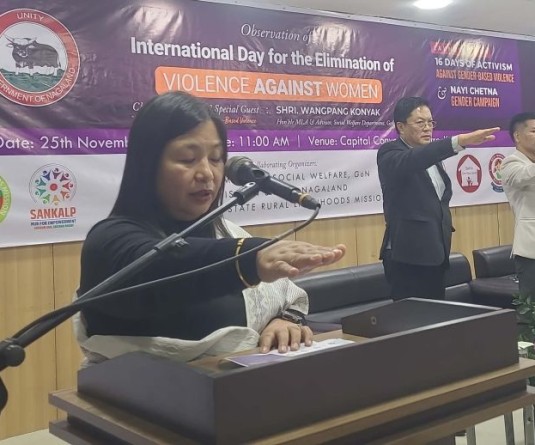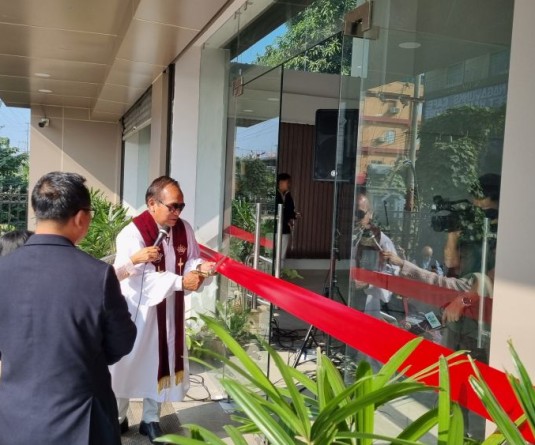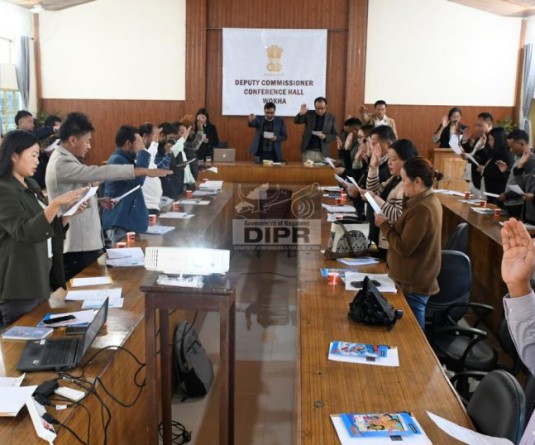
Morung Express News
Kohima | August 9
Celebrating the International Day of the World’s Indigenous Peoples on August 9, students and faculty of Kohima College gathered at the college auditorium in their traditional best. Jointly organised by the Naga Peoples’ Movement for Human Rights (NPMHR) in collaboration with Kohima College Alumni Association and supported by the Asia Indigenous Peoples Pact (AIPP), the event was held at Kohima College under the theme ‘Protect our Rights, Our Lands!’
“As we celebrate this International Day of the World’s Indigenous Peoples, we are doing so fully conscious of the fact that it was our elders and leaders of the Naga Political movements, starting from the Naga Club to the present day Naga political Groups who have protected our rights, our lands and kept it safe and secured through their self-less sacrifices during the most crucial and painful period of our history. And today, we are basking in the glory of their achievements, notwithstanding pending an honorable and acceptable solution, juxtaposed with factionalism and uncontrollable internal contradictions,” said Neingulo Krome, NPMHR Secretary General.
Stressing on the theme ‘Protect our rights, our lands,’ Krome stated that the lands of Indigenous Peoples are not only being exploited but forcefully taken away. In the case of Nagas, they are able to assert their rights, although faced with opposition from occupational forces, but ultimately acknowledged and recognized, he said.
He reminded that even if the principles of the Naga Political Movement do not recognize or accept the imposition of Indian laws and its Constitutional legality over the Nagas, the fact remains that Naga way of life and their lands and its resources are protected under Article 371 A of the Indian Constitution.
Speaking on the UN’s theme, ‘Indigenous Peoples’ Right to Education’, Neilezo Tep, Vice President of Kohima College Alumni Association asserted that education is the strongest way to empower and strengthen. He encouraged students not to embark on artificial ideas of the outside world but instead think locally and introspect on the happenings around one’s society.
“We know what is happening, knowing the reality let us not be complacent. Maintain the balance of assimilation. The more we assimilate, the more we compromise. Let us fight to preserve our identity. Let us be firm on our roots,” he called out.
Marina Kenglang, a Peace Activist from Changlang District shared on the problems faced by indigenous peoples in Arunachal Pradesh due to the influx of outsiders. “Our lands have been taken away by outsiders, in some cases arbitrary actions by Government of India and in some cases due to the low population of the IPs. Though Arunachal Pradesh has provisions to protect the indigenous rights like PRC and ST certificates, people can only own land if they possess ST certificates,” said Kenglang.
Meanwhile, on concerns regarding the loss of indigenous dialects in Naga families and homes, Betoka Swu from NPMHR urged young students to take the responsibility of preserving one’s own dialect. “The younger generation has to take up the challenge. We have to be practical,” noted Swu, while suggesting that simple tasks like texting through one’s own dialect can go a long way in passing on and preserving one’s indigenous dialect.
Later, a discussion with the faculty and students was held during which concerns on Article 371 (A), AFSPA and preservation on Naga culture were discussed.
Nagas will continue to assert for right to self-determination
Tahamzam (Senapati), August 9 (MExN): The Naga people in Manipur, meanwhile, celebrated the International Day of the World’s Indigenous Peoples at Thangal General Memorial Ecological Park in Senapati district under the theme ‘Indigenous Peoples’ Right to Education.’
The United Naga Council (UNC), Naga Women’s Union, Naga Peoples Movement for Human Rights (South) and the All Naga Students’ Association, Manipur came together here to pledge that “We, the Naga people” will never be “deterred” because “the Nagas have the right to unify their divided ancestral homeland and live together as a dignified family as any other people.”
With the firm belief that as indigenous peoples of the world, the Naga people “will continue to assert for our inherent right to self-determination and self-government while respecting the same of others in good faith,” they pledged. The organizations significantly also pledged to protect and promote universal human rights and entitlement “particularly within our own communities, without prejudice toward race, colour, gender, disability, language, religion, creed, national origin, property, age, or other status.” (Refer to page 3 for complete pledge)
Right to Education
Gaidon Kamei, President of the UNC, while delivering his keynote address highlighted Article 14 of the UN Declaration on the Rights of Indigenous Peoples, which stated that “Indigenous peoples have the right to establish and control their educational systems and institutions providing education in their own languages, in a manner appropriate to their cultural methods of teaching and learning.”
Despite this and more provisions, he noted that the right to indigenous education continues to remain a challenge. A gap remains “not only in terms of access to opportunities but also in regard to quality and cultural appropriateness and relevance of curricula,” he noted, giving examples of Hindi and Manipuri, or even the history of other empires, being made compulsory subjects while local languages have not yet reached the classrooms.
He also stressed on the system of education in Naga Morungs that went ‘beyond four walls.’ They imparted real life knowledge that focused on values and principles “underpinning our identity and history.” The songs and stories taught in Morungs reflected education on the lived environment—the forests, animals, spirits, as well as “our struggles and victories.”
The loss of these is “a greater threat to our survival as a people than the thousands of guns pointed at us,” observed the UNC President.
The program also heard from Prof. A Lanunungsang Ao who urged the need to bring proper awareness on the rights of the Indigenous Peoples from a grassroots level, with the UNDRIP translated into all Naga languages.






